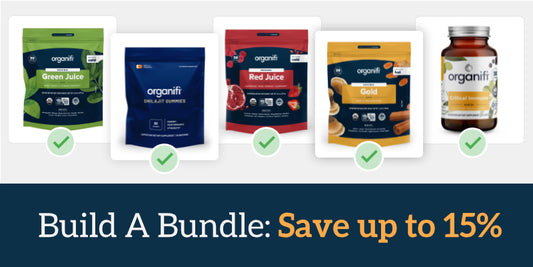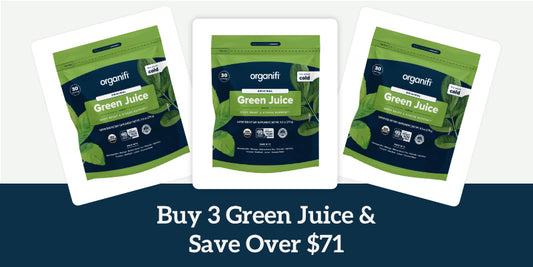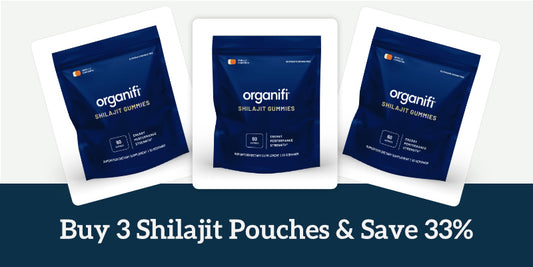It’s allergy season and the last thing you thought you’d hear about was “bee pollen benefits.”
Am I right?
Surprisingly the science behind bee pollen shows that it has many hidden health benefits, and while it gets a bad rap for being a common allergen for some people, there’s plenty to know and love about bee pollen.
- Bee pollen is a natural mix pellet containing flower pollen, flower nectar, bee secretions, honey, wax, and enzymes used as the primary source of food for bee hives.
- Bee pollen benefits are being studied and leveraged for nutrition support, weight loss, allergy control, heart disease, liver detox, immunity, and more.
- Bee pollen contains more than 250 active substances including all the nutrients necessary for life: carbohydrates, protein, vitamins, minerals, fatty acids, sugars, fiber, and more.
- Bee pollen benefits most people, as it is very safe to consume. However, pregnant or lactating women, as well as people with known bee pollen or bee sting allergies are recommended to consult with a licensed physician or avoid it as a precaution.
Get ready to add bee pollen to your diet after you learn about all the wonderful bee pollen benefits you may have been missing out on:
Bee Pollen Benefits
Bee pollen is actually a remarkably potent natural substance with health and healing benefits we’re still studying to fully understand. Some little-known facts about bee pollen:
#1 Important Source of Nutrition
Bee pollen carries more protein than pretty much any other animal source and also more amino-acids than an equal portion (in weight) of chicken eggs or meat.
Bee Pollen Nutritional Profile:
- 30% carbohydrates
- 26% of sugar ( fructose and glucose)
- 23% protein
- 10% essential amino-acids
- 5% lipids (fatty acids)
- 2% of phenolic compounds
- 1.6% of minerals
- 0.6 % water-soluble vitamins (C, B1, B2, and B6)
- 0.1 % fat-soluble vitamins ( A, D, and E)
Bee pollen contains niacin, thiamine, biotin, and folic acid, in addition to polyphenols, tocopherol, carotenoids, phytosterols, enzymes, and coenzymes. Among the minerals found bee pollen you’ll find calcium, phosphorus, magnesium, sodium, potassium, iron, copper, zinc, manganese, silicon and selenium.
It’s a superfood!
#2 Bee Pollen for Allergies
Bee pollen is a natural remedy for allergy relief and has been used in traditional Chinese, Egyptian, and Greek medicine for more than 2,000 years. This may sound counterintuitive but research shows bee pollen benefits people and animals in different studies by reducing histamine production through mast cell inhibition. Over the counter medicine is mostly comprised of “antihistamines.”
Antihistamines tend to cause drowsiness, which at times may be a helpful respite from sleepless nights due to allergies, but not so convenient during work hours. If allergies -or other things- are keeping you up at night try a nighttime tea like our Gold, and sprinkle some bee pollen on it.
#3 Bee Pollen Antioxidant Benefits
Free radicals are harmful cells with unpaired electrons that latch onto healthy cells and break them down, antioxidants protect the body against free radicals and their associated decay. Oxidative stress caused by free radicals has been extensively linked to chronic illnesses including cancer. Due to bee pollen’s high antioxidant levels, it is being considered both as a a health food diet supplement, and for patients undergoing treatment for chronic disease.
#4 Bee Pollen for Weight Loss
There is no specific evidence pointing to a bee pollen weightloss connection; it is not a miracle supplement that can replace healthy eating habits and exercise. However, the bee pollen weightloss reputation comes from its metabolic boosting properties: bee pollen may help regulate hormones and increase metabolic rate, which eventually leads to fat burning.
Additionally, there are other ways in which bee pollen benefits your weightloss journey - as a low-calorie but high-nutrient substitute, good source of fiber, and as significant aid in muscle recovery through its high-protein content.
#5 Bee Pollen Benefits the Immune Response
Bee pollen benefits include antibacterial, anti-fungal, antioxidant, and antiviral properties, thus stimulating and supporting the immune system. Several studies have found that bee pollen can be effectively used against some harmful bacteria, such as E. Coli, Salmonella, Staphylococcus Aureus, and Pseudomonas aeruginosa among others. Since they help mast cells (inside white blood cells) they support the immune response.
#6 Bee Pollen May Support Liver Detox
Animal studies have shown that bee pollen may have hepatoprotective properties against different kinds of liver damage and may even help repair alcohol and drug abuse damage. A 2013 study found that bee pollen promotes “liver cell healing” and compared it to similarly powerful milk thistle, considering bee pollen safer in some cases.
How to Consume Bee Pollen
Bee pollen comes in various supplement forms, they look like very small yellow, orange, brown or tan balls. The taste and protein content may vary according to the plant origin of the pollen, so it’s important to research the product and read the label if you’re getting it from the health-food store. Local farmers may be able to provide more insight on their specific type of pollen - don’t be afraid to ask!
The flavor ranges from a little bitter to sweet and nutty and it makes a great addition to smoothie bowls, green juice recipes, and even salads as a low-calorie, high-nutrient, topping.
To leverage the best of the bee pollen benefits first make sure you’re not allergic to bee pollen balls:
Talk to your preferred licensed physician or perform a small test at home, placing a couple of pieces in your mouth and waiting two minutes to chew and swallow. If no allergic symptoms develop in 24 hours (runny nose, sneezing, watery eyes, itchiness, red skin patches) then you may start testing with a gradual approach: add ½ teaspoon of bee pollen to your breakfast and go up to three full tablespoons within a four-week period.
If you have no known allergies or do not suspect one, try sprinkling one tablespoon a day in your breakfast.
Bee Pollen Uses
Now that you know how to consume bee pollen, take a look at this deliciously nutritious bee pollen uses so you can stop those allergies in their tracks, boost your immunity, and reap all the bee pollen benefits nature has to offer!
Bee Pollen on Yogurt, Cereal or Oatmeal
Just sprinkle on your favorite plain yogurt, cereal or oatmeal recipe. These are our top two faves!
- Mega easy Frozen Yogurt with bee pollen by Hello Glow
- Bee-Awesome Oatmeal Porridge with quinoa, oatmeal, persimmons, and nuts by Kellies Food to Glow
Bee Pollen in Smoothies
A great high-protein addition to your morning or post-workout boost! Add it to:
- A beginner green smoothie recipe with turmeric, cocoa, kale, and spinach - yum!.
- Or just add to your Organifi Green Juice mix to supercharge your day.
Bee Pollen on Acai Bowls
Glow up your acai bowl adding anything from a teaspoon to a tablespoon of bee pollen. We love these ideas:
- Frozen acai, raspberries, bananas, and your favorite rolled oats or granola, topped with bee pollen for full antioxidant power. Recipe from Lexis Clean Kitchen.
- Cacao nibs, bee pollen, and coconut flakes top this acai bowl that also rocks the banana-acai-berries combination, but with a chocolate twist. Recipe from The Movement Menu.
Bee Pollen Cookies and Granola Bars!
Yes! Given their at times nutty and somewhat sweet flavor, you can use them in cookies and granola recipes. You can also simply sprinkle them on a granola bowl of your choice.
- Vegan, gluten-free, and sugar-free, these date, banana, and oatmeal cookies are actually pretty sweet and easy to make. Recipe from Umami and Me.
- Raw granola bars with honey, bee pollen, nuts, and berries. Recipe by Azure Standard. The raw bars keep the living foods (bee pollen and honey) and their enzymes active, perfect to reap those bee pollen benefits.
As a Salad Topping or Salad Dressing!
You can add some natural protein, liver-detox, and immune support (those bee pollen benefits!) to your plain salad just by tossing some bee pollen on it. Or you can get creative and try some healthy salad dressings enriched with the nutty-sweet bee pollen flavor.
- Spoon-licking bee pollen vinaigrette idea by Feast Magazine
- No mustard “honey-mustard” with bee pollen dressing by The Rawtarian.
The Takeaway
Bee pollen benefits have yet to be fully studied and proven, but research shows that bee pollen for allergies may work for most people with mild to moderate allergies, by inhibiting mast cell activity that wrongfully releases histamine when a non-threatening substance is mislabeled as harmful by the immune system.
Bee pollen may also support weight loss, natural liver detoxification, and the immune system due to its high antioxidant properties and numerous nutrients. If you want to get the benefits of bee pollen, you can try adding it to teas, smoothies, acai bowls, salads, and even cookie recipes to gradual results.
If you have known bee stings and bee pollen allergies, are pregnant or lactating you may want to consult with a doctor before trying bee pollen. Otherwise, you may add this precious superfood to your diet starting at half a teaspoon and growing to up to three tablespoons per day.




